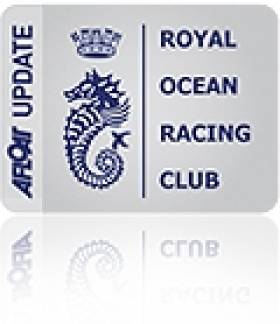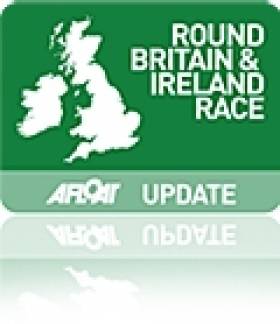Displaying items by tag: Tonnerre
Carrickfergus Navigator Ian Moore Plots Aegir Caribbean Course
On loan from the Oracle America's Cup Team, Northern Ireland ace navigator Ian Moore is the navigator on board the Carbon built 80-footer Aegir for this week's RORC race in the Caribbbean.
Antigua Yacht Club is buzzing with excitement, with two days to go to the start of the 600-mile race around the central Caribbean. Yacht crews are busy at work making final preparations for the Royal Ocean Racing Club's (RORC) Caribbean 600. Falmouth Harbour is an impressive sight with the RORC fleet safely moored up next to the yacht club.
RORC Yacht of the Year ready for battle
Piet Vroon's Ker 46, Tonnerre de Breskens - the RORC 2010 Yacht of the Year - arrived just before dusk on Friday. The delivery crew, all six of whom will also be racing, endured a 1,000 mile beat to Antigua from Jamaica: "This will be our fourth and final event in the Caribbean." Explained Piet Vroon. "This is the first time that I have done this race and it is the main reason that we came to the Caribbean. All of my crew said that this is a race that they want to do and I am very much looking forward to it."
Tonnerre is one of three boats that competed in the Pineapple Cup, the opening rubber of the Atlantic Ocean Racing Series. George David's Rambler 100, Richard Oland's Vela Veloce and Hugo Steinback's Dubois 90, Genuine Risk also competed in the Pineapple Cup which Genuine Risk won on corrected time. Vela Veloce is a Southern Wind 52, which cleaned up in Key West race week in January.
Entries from Australia and 14 other nations
Yachts representing 15 Nations have come to Antigua to compete in the 600-mile spectacular, but none have come as far as Chris Bull's Cookson 50, Jazz. The canting-keel flyer arrived in Antigua on Friday, having made an epic journey bycontainer ship and sail from Australia, after a fantastic performance in the Rolex Sydney Hobart.
"It's been hard work getting the boat here from Australia, but we have done it, which just goes to show it is possible." Commented Boat Captain, Anthony Haines. Jazz's journey started on January 8th from Sydney, Australia to Savannah, Georgia. After which the delivery crew sailed 1400 miles to get Jazz to Antigua on time.
"Ever since the RORC conceived the idea of this race I have wanted to do it," said Chris Bull on he dock in Antigua. "I am also keen to do the Transatlantic Race and try and win the Atlantic Ocean Racing Series which I think is an excellent initiative which the RORC are involved with."
Rock Stars and Corinthian Sailors Rub Shoulders
From Lithuania, the Volvo 60, Ambersail debuts in the Caribbean and counts veteran round the world sailor Magnus Olsen in their crew. Ambersail is well travelled, having competed in last year's Sevenstar Round Britain and Ireland Race and the Rolex Middle Sea Race.
Ondeck's Farr 65, Spirit of Minerva counts British solo-sailor Hannah White amongst the crew: "Effectively there are 10 legs and well over 600 miles of racing in fantastic trade wind conditions which I am sure will be a strong test for navigators and crews in equal measure." Commented Hannah.
Class 40 World Champions on the line
Six Class 40s are expected, possibly more. Tony Lawson's Concise and Gonzalo Botin are past and current Class 40, world champions. Tony Lawson, owner of Concise expects a close duel with Tales: "There is no doubt that the Spanish team will be fast and possibly more suited to lighter conditions, but I am confident that the team on Concise will be fully focused and they are in control of a quick, well prepared boat."
Power and Elegance Combine
RORC Commodore, Andrew McIrvine has chartered the elegant and powerful 154 ft schooner, Windrose of Amsterdam. The crew has taken the magnificent yacht through its paces, spending two days practicing manoeuvres: "It is a very different kind of sailing to my First 40." Commented Andrew McIrvine. "The sheer size of the sails and equipment make for extremely physical work and manoeuvres are far more complex. Communication from front to back is only possible by hand signals. We had some good pressure during our practice session, which confirmed that Windrose is a powerful yacht, literally built for Caribbean sailing."
Navigator's make their Predictions
Brian Benjamin's Carbon Ocean 82, Aegir has been out testing sails and the crew, visiting the top part of the race course all night Friday. Night sailing makes up close to half the time during the race. Boat captain Shreda Duke confirmed that the exercise was very successful in bedding in the crew to their proposed watch-system. Aegir's navigator for the race is Ian Moore on loan from the Oracle America's Cup Team. Moore concurs with Hugh Agnew, ICAP Leopard's navigator, the prediction of stable trade wind sailing but added: "The first key area of the race may well come as night falls. Aegir should be approaching Nevis at dusk and the first really tricky part of the course. The islands of Nevis and St Kitts are high, which will throw out quite a wind shadow through this area; there will be a lot of gear changes in between the lulls and puffs of acceleration. The big decision from a navigator's point of view will be how far off the leeward side of these islands to go."
In Falmouth Harbour, the air temperature is a balmy 27º C and a fair breeze is flowing in from the northeast, meaning that the trade winds are functioning, but it's an ever-changing picture. Read John Burnie's expert summary on the RORC Caribbean 600 web site: http://caribbean600.rorc.org/
100 footers Go Head to Head
ICAP Leopard set the monohull course record in 2009, completing the course in 44 hr 5 min 14 sec and Mike Slade's team believe that they could beat the record, although they may not be the first home. George David's stunning Maxi, Rambler 100 is dockside in Falmouth and are favourites to take line honours. George David has secured the assistance of Ken Read to the afterguard and some of Ken's Puma Volvo Ocean Race crew. It is the first time that these two 100 foot canting keel maxi's have raced each other with ICAP Leopard having taken an interesting strategy and dropped their rating considerably, in a bid to gain handicap honours.
Local Knowledge from Caribbean Entries
Local interest comes from Bernie Evan-Wong who is competing in the race for the third time in his Mumm 36, High Tension. From Guadeloupe there is a Class 40, Territoires Attitudes, skippered by David Ducosson.
34 boats are expected on the start line on February 21st February. The RORC Caribbean 600 web site contains regular updates on the race, blogs from the boats and the progress of the boats, which have trackers, can be followed via the website: http://caribbean600.rorc.org/
Tonnerre Expected Tonight
This evening, Piet Vroon's Ker 46, Tonnerre de Breskens, the June winner of Wicklow's Round Ireland race is now tantalizingly close to an overall victory in the Sevenstar Round Britain and Ireland Race. With 101 miles to go, Tonnerre de Breskens could well make it to the Royal Yacht Squadron Line before 01:54:35 tomorrow morning. None of the other boats still racing have a real chance of beating them on corrected time.
The Sevenstar Round Britain and Ireland Race is now well into the eighth day. The crew on the racing yachts will have become totally accustomed to life on board. The yacht and its contents is all they have. For days now they have been confined to their yachts, matters that have no real importance in normal life become desperately important, even losing a hat or a glove can have a major effect on them. For those yachts out off the west coast of Ireland, they may not have seen land or even another ship for days. To the crew racing in the Sevenstar Round Britain and Ireland Race, the yacht has become their own little world.
Last night Clipper 68, Hull and Humber found themselves in the teeth of gale force winds off the west coast of Ireland. As one crew member explained from on board:
"Down with the 1, on with 2, on with a reef, off with 2 and on with 3, on with another reef. All the while with starboard watch on the foredeck, pitching in a steep Atlantic sea. Loads of cold water, some of it green, giving us a refreshing jacuzzi. Even Al Duns, he of Norwegian and Arctic sailing, said he had never been quite so wet before... It was a tired starboard watch that tumbled into their bunks at 2 a.m. to be relieved by port watch, to take us on to St Kilda's, then some 30 miles distant. Never a watch to do things by halves, port watch not only rounded St Kilda's, but simultaneously passed our arch-nemesis John B."
At midday today, Charles Ivill, owner of Grand Soleil 54, John B called in 40 miles from the Fastnet Rock and explained that they have been having a few problems:
"At the moment, we have 15 knots from the north and all the crew are well on John B but we have had a few issues. About 150 miles from Muckle Flugga our vang failed, no real problems upwind, but downwind has been another story. We have to put three reefs in the main which is not exactly improving the boat speed! Also, we've managed to get sea water in the fresh water tanks. We have plenty of water to wash in, although you wouldn't believe it if you could smell Timmy Mills' feet! Drinking water is on rations and I am very happy to say that the food is still great. Each crew has made three meals a day and my favourite has got to be Helen's shepherd's pie. It has been a tough race, a real challenge but if you ask me or any of the crew if we will be doing it again, the answer is – absolutely yes!"
Steven Anderson's First 40.7, Encore still leads IRC One by some margin but Adrian Lower's team from the Royal Burnham Yacht Club on Swan 44, Selene and Harry Heijst's Dutch S&S 41, Winsome are having a close battle, with Winsome just holding the lead on corrected time.
Tonnerre de Breskens look set to claim the IRC Zero win tonight and may depose Artemis Ocean Racing at the top of the IRC leader board in the Sevenstar Round Britain and Ireland Race.






























































